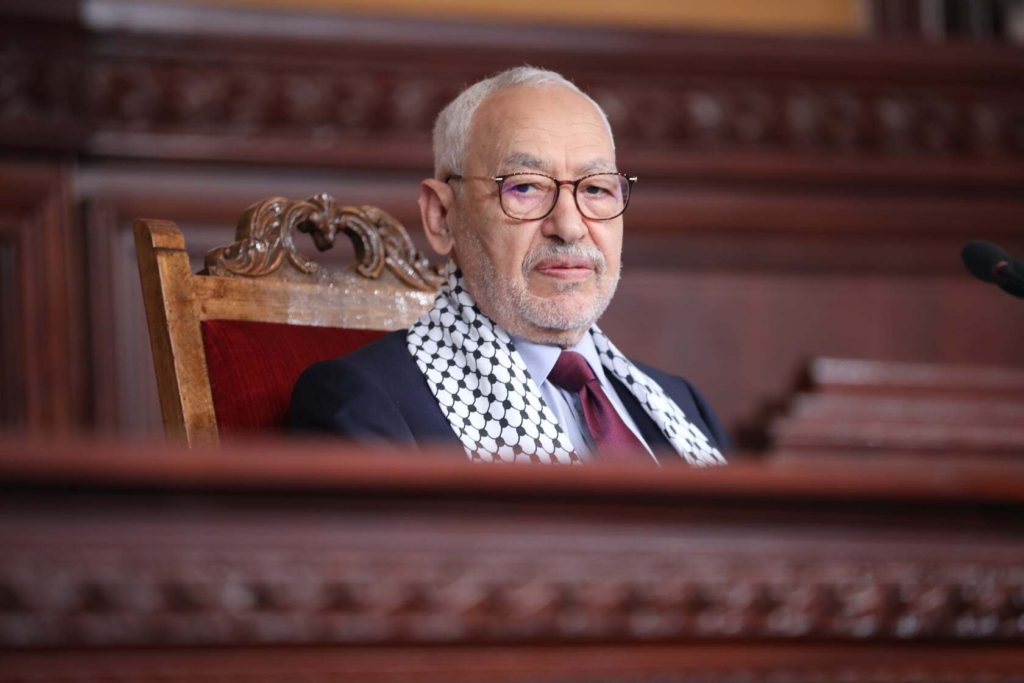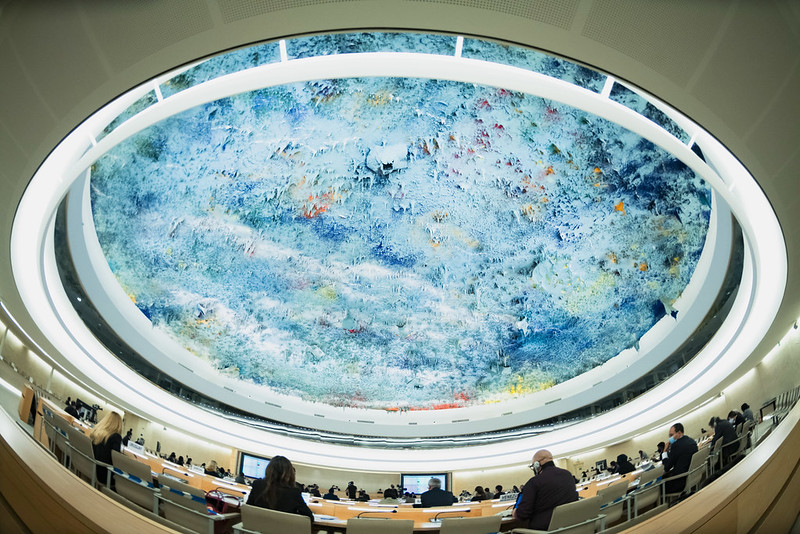


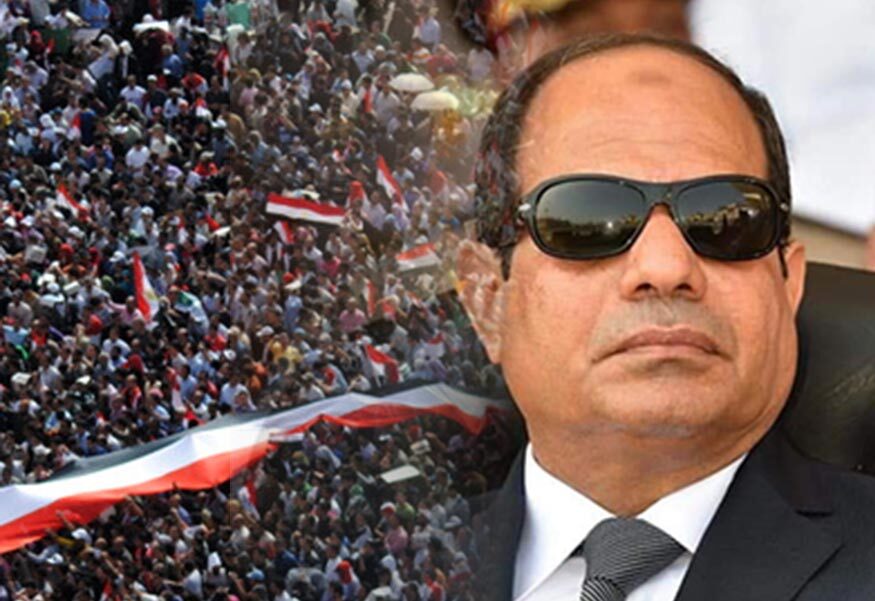
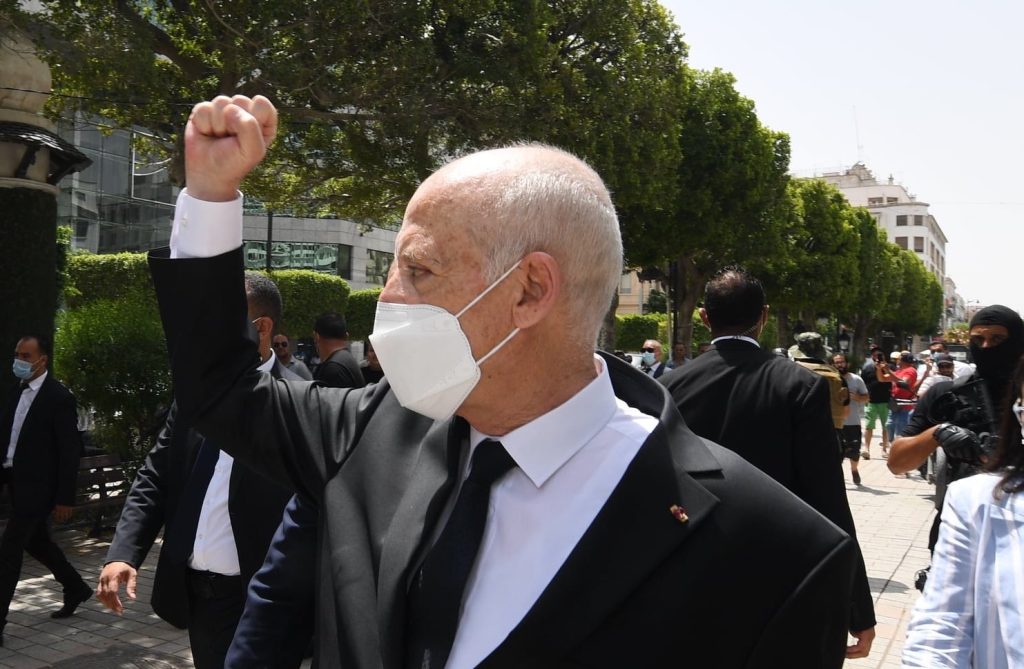
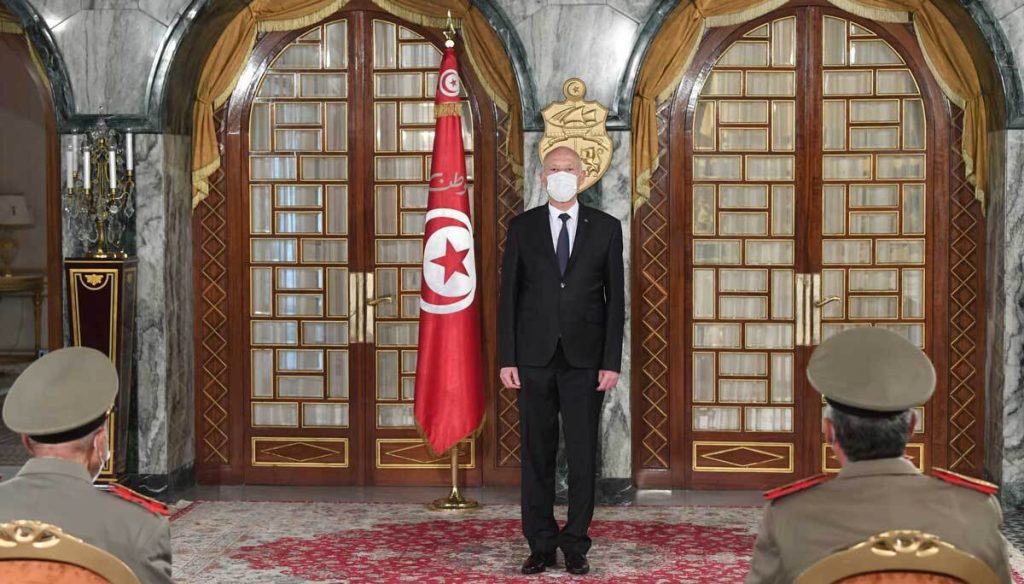
On July 25, 2021, amidst rising anger among Tunisian citizens over an escalating pandemic crisis, a deteriorating economy, and public institutions crippled by endless infighting among politicians, Tunisian President Kais Saïed granted himself full executive powers, dismissed the prime minister, “froze” the parliament, and removed immunity for MPs. Saïed assured the Tunisian public, among whom he currently appears to enjoy wide support, that these actions were necessary “to save Tunisia” and in accordance with Article 80 of the constitution. Some Tunisians, however, disagree that his moves are constitutional and warn that democracy is at grave risk.
As Tunisia’s fragile democracy is plunged into uncertainty, please join POMED for an expert briefing on what precipitated the crisis, what has unfolded since July 25, and what may be needed for Tunisia to avoid sliding back into authoritarianism and for its democracy to survive.
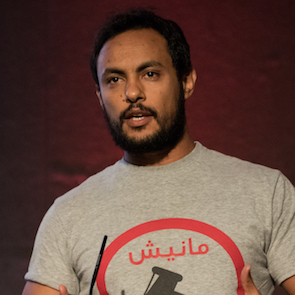
Achref Aouadi is a Tunisian activist and the founder of IWatch, a watchdog anti-corruption organization founded after the 2011 revolution. IWatch works to organize and advocate for increased government transparency and fights against corruption. Mr. Aouadi was chosen to represent the Tunisian civil society at the United Nations Convention Against Corruption and serves as an Ashoka fellow. In 2019, he was awarded POMED’s Leaders for Democracy Award.
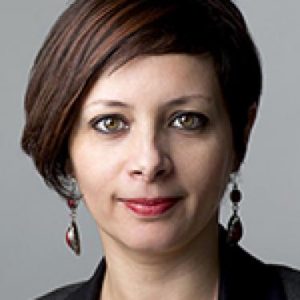 Amna Guellali is Amnesty International’s Deputy Regional Director for the Middle East and North Africa, based in Tunis. Previously, she was the director of the Tunis office of Human Rights Watch and was responsible for research on Tunisia and Algeria in the organization’s Middle East and North Africa division, investigating human rights abuses in both countries. Before joining Human Rights Watch, Dr. Guellali worked as an analyst at the office of the Prosecutor of the International Criminal Court in the Hague and as Senior Researcher at the department of international law at the Asser Institute. She has also served as legal officer at the regional delegation of the International Committee of the Red Cross in Tunis. Dr. Guellali holds a PhD from the European University Institute in Florence. In 2017, she was awarded POMED’s Leaders for Democracy Award.
Amna Guellali is Amnesty International’s Deputy Regional Director for the Middle East and North Africa, based in Tunis. Previously, she was the director of the Tunis office of Human Rights Watch and was responsible for research on Tunisia and Algeria in the organization’s Middle East and North Africa division, investigating human rights abuses in both countries. Before joining Human Rights Watch, Dr. Guellali worked as an analyst at the office of the Prosecutor of the International Criminal Court in the Hague and as Senior Researcher at the department of international law at the Asser Institute. She has also served as legal officer at the regional delegation of the International Committee of the Red Cross in Tunis. Dr. Guellali holds a PhD from the European University Institute in Florence. In 2017, she was awarded POMED’s Leaders for Democracy Award.
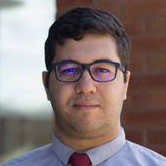 Mohamed-Dhia Hammami is an independent researcher and analyst. After growing up in the suburbs of Tunis under the Ben Ali regime, Mr. Hammami took part in the 2011 revolution and then got involved in public life as a student activist at the University of Tunis and as a parliamentary assistant in the National Constituent Assembly. He subsequently worked as a journalist at Nawaat and as a researcher and a consultant for IWatch, the Truth and Dignity Commission, the Natural Resources Governance Institute, Lawyers Without Borders, and the University of York on corruption and other natural resources-related issues. Mr. Hammami received his BA from Wesleyan University. This fall, he will begin a PhD program at Syracuse University’s Maxwell School of Citizenship and Public Affairs.
Mohamed-Dhia Hammami is an independent researcher and analyst. After growing up in the suburbs of Tunis under the Ben Ali regime, Mr. Hammami took part in the 2011 revolution and then got involved in public life as a student activist at the University of Tunis and as a parliamentary assistant in the National Constituent Assembly. He subsequently worked as a journalist at Nawaat and as a researcher and a consultant for IWatch, the Truth and Dignity Commission, the Natural Resources Governance Institute, Lawyers Without Borders, and the University of York on corruption and other natural resources-related issues. Mr. Hammami received his BA from Wesleyan University. This fall, he will begin a PhD program at Syracuse University’s Maxwell School of Citizenship and Public Affairs.
 Stephen McInerney (moderator) is the executive director of the Project on Middle East Democracy (POMED). Prior to joining POMED in 2007, he had spent six years living, working, and studying in the Middle East and North Africa—two years each in Egypt, Lebanon, and Qatar. He spent two years in a master’s degree program in the Center for Arab and Middle Eastern Studies at the American University of Beirut, one year on a fellowship at the Center for Arab Study Abroad (CASA) at the American University in Cairo, and three years teaching at Cairo American College and the American School of Doha. He received a master’s degree from Stanford University and is fluent in Arabic.
Stephen McInerney (moderator) is the executive director of the Project on Middle East Democracy (POMED). Prior to joining POMED in 2007, he had spent six years living, working, and studying in the Middle East and North Africa—two years each in Egypt, Lebanon, and Qatar. He spent two years in a master’s degree program in the Center for Arab and Middle Eastern Studies at the American University of Beirut, one year on a fellowship at the Center for Arab Study Abroad (CASA) at the American University in Cairo, and three years teaching at Cairo American College and the American School of Doha. He received a master’s degree from Stanford University and is fluent in Arabic.

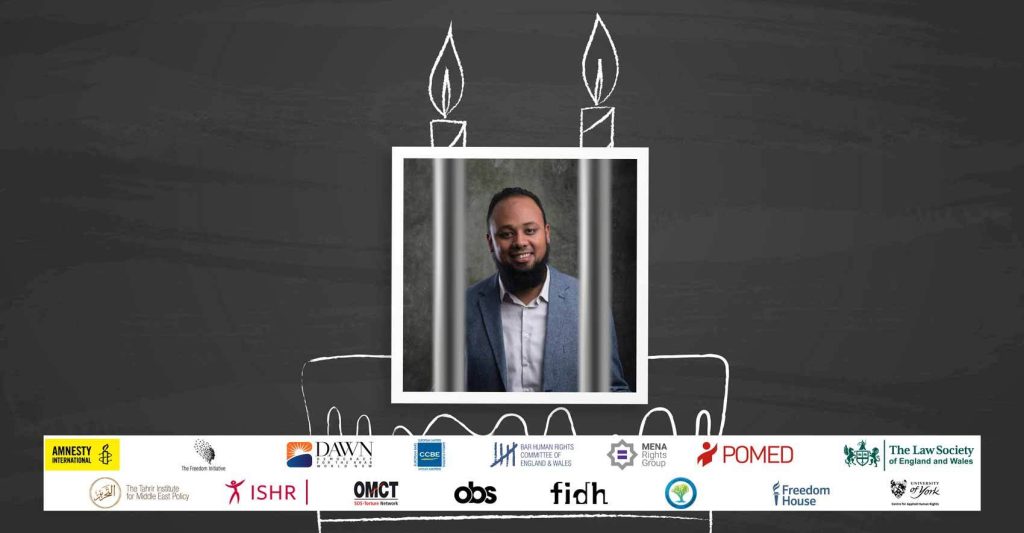
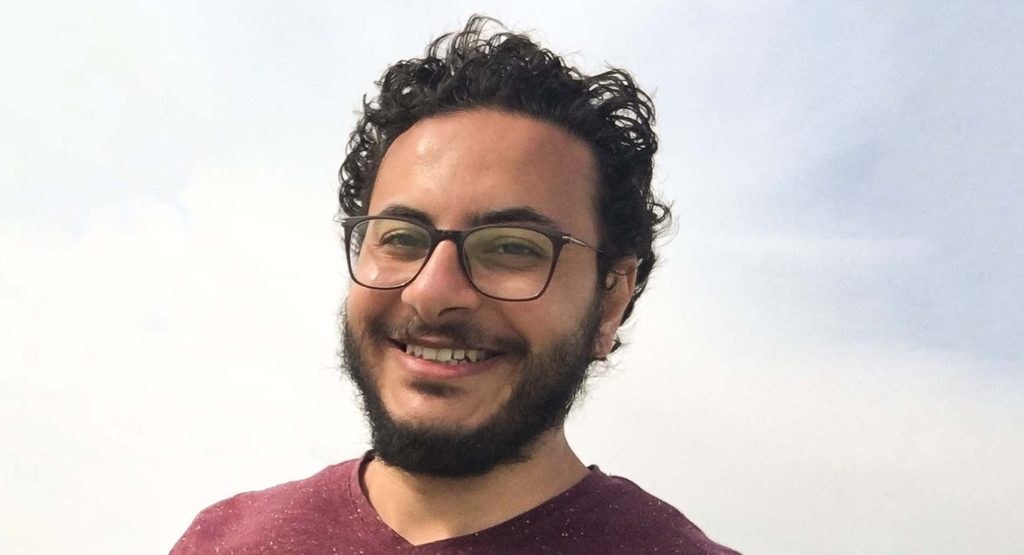

On July 19, Jordan’s King Abdullah II will meet with President Biden at the White House, marking the first official Washington visit of an Arab head of state during the Biden administration. Abdullah’s visit comes at a moment of particular political uncertainty, economic decline, and escalating repression in the Kingdom. In April, the Palace detained the King’s half-brother Prince Hamzah, along with several other high-profile figures, for an alleged “coup” plot, but many view the allegations as an attempt to distract from growing discontent over Abdullah’s rule and from the rising popularity of Prince Hamzah. Against this backdrop of regime challenges, the United States—Jordan’s leading foreign backer—has continued to pursue a “business as usual” policy, expressing public support for the King without pressing for meaningful reforms.
To explore the domestic situation in Jordan and how the Biden administration and Congress should respond, POMED is pleased to host an expert discussion on Thursday, July 15, in advance of the King’s White House meeting.
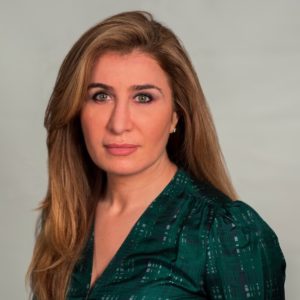 Bessma Momani is Full Professor of Political Science and Assistant Vice-President of Research and International in the Office of Research at the University of Waterloo. She is also a senior fellow at the Centre for International Governance and Innovation (CIGI) and a nonresident fellow at the Arab Gulf States Institute of Washington. Dr. Momani has previously been a nonresident senior fellow at the Brookings Institution and the Stimson Center, and was a visiting scholar at Georgetown University’s Mortara Center. She was a 2015 Fellow of the Pierre Elliott Trudeau Foundation and a 2011-12 Fulbright Scholar. She is a regular contributor to national and international media on Arab politics and on global economic governance issues. She has written editorials for the New York Times, Economist, Globe and Mail, Toronto Star, Ottawa Citizen, among others. Dr. Momani received her BA from the University of Toronto, MA from the University of Guelph, and PhD from the University of Western Ontario.
Bessma Momani is Full Professor of Political Science and Assistant Vice-President of Research and International in the Office of Research at the University of Waterloo. She is also a senior fellow at the Centre for International Governance and Innovation (CIGI) and a nonresident fellow at the Arab Gulf States Institute of Washington. Dr. Momani has previously been a nonresident senior fellow at the Brookings Institution and the Stimson Center, and was a visiting scholar at Georgetown University’s Mortara Center. She was a 2015 Fellow of the Pierre Elliott Trudeau Foundation and a 2011-12 Fulbright Scholar. She is a regular contributor to national and international media on Arab politics and on global economic governance issues. She has written editorials for the New York Times, Economist, Globe and Mail, Toronto Star, Ottawa Citizen, among others. Dr. Momani received her BA from the University of Toronto, MA from the University of Guelph, and PhD from the University of Western Ontario.
 Curtis Ryan is Professor of Political Science at Appalachian State University. Dr. Ryan served as a 1992-93 Fulbright Scholar at the Center for Strategic Studies, University of Jordan and was twice named a Peace Scholar by the United States Institute of Peace. In addition to his contributions to Middle East Report, his articles have been published in the Middle East Journal, the British Journal of Middle East Studies, Studies in Ethnicity and Nationalism, World Politics Review, Arab Studies Quarterly, Israel Affairs, Orient, Southeastern Political Review, Journal of Third World Studies, Middle East Policy, and the Journal of Middle East Law and Governance. He is the author of three books: Jordan in Transition: From Hussein to Abdullah (2002), Inter-Arab Alliances: Regime Security and Jordanian Foreign Policy (2009) and Jordan and the Arab Uprisings – Regime Survival and Politics Beyond the State (2018). He received his BA in History and Political Science from Drew University and his MA and PhD in Political Science from the University of North Carolina at Chapel Hill.
Curtis Ryan is Professor of Political Science at Appalachian State University. Dr. Ryan served as a 1992-93 Fulbright Scholar at the Center for Strategic Studies, University of Jordan and was twice named a Peace Scholar by the United States Institute of Peace. In addition to his contributions to Middle East Report, his articles have been published in the Middle East Journal, the British Journal of Middle East Studies, Studies in Ethnicity and Nationalism, World Politics Review, Arab Studies Quarterly, Israel Affairs, Orient, Southeastern Political Review, Journal of Third World Studies, Middle East Policy, and the Journal of Middle East Law and Governance. He is the author of three books: Jordan in Transition: From Hussein to Abdullah (2002), Inter-Arab Alliances: Regime Security and Jordanian Foreign Policy (2009) and Jordan and the Arab Uprisings – Regime Survival and Politics Beyond the State (2018). He received his BA in History and Political Science from Drew University and his MA and PhD in Political Science from the University of North Carolina at Chapel Hill.
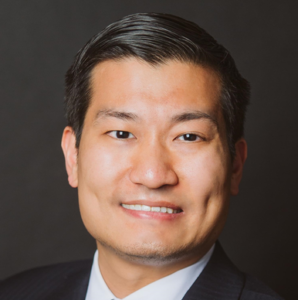 Sean Yom is Associate Professor of Political Science at Temple University and Senior Fellow in the Middle East Program at the Foreign Policy Research Institute. He is a specialist on regimes and governance in the Middle East, especially in Arab monarchies like Jordan, Kuwait, and Morocco. Dr. Yom’s research engages topics of authoritarian politics, democratic reforms, institutional stability, and economic development in these countries, as well as their implications for U.S. foreign policy. His publications include the books From Resilience to Revolution: How Foreign Interventions Destabilize the Middle East (2016) and Government and Politics of the Middle East and North Africa, 9th edition (2020); articles in print journals such as Comparative Political Studies, European Journal of International Relations, Studies in Comparative International Development, and Journal of Democracy; and contributions in online venues like Foreign Affairs, Middle East Eye, and the Washington Post. Dr. Yom also advises country-level work with international NGOs, law firms, and sovereign clients. Dr. Yom received his BA from Brown University and his PhD from Harvard University.
Sean Yom is Associate Professor of Political Science at Temple University and Senior Fellow in the Middle East Program at the Foreign Policy Research Institute. He is a specialist on regimes and governance in the Middle East, especially in Arab monarchies like Jordan, Kuwait, and Morocco. Dr. Yom’s research engages topics of authoritarian politics, democratic reforms, institutional stability, and economic development in these countries, as well as their implications for U.S. foreign policy. His publications include the books From Resilience to Revolution: How Foreign Interventions Destabilize the Middle East (2016) and Government and Politics of the Middle East and North Africa, 9th edition (2020); articles in print journals such as Comparative Political Studies, European Journal of International Relations, Studies in Comparative International Development, and Journal of Democracy; and contributions in online venues like Foreign Affairs, Middle East Eye, and the Washington Post. Dr. Yom also advises country-level work with international NGOs, law firms, and sovereign clients. Dr. Yom received his BA from Brown University and his PhD from Harvard University.
 Arwa Shobaki is POMED’s Managing Director. She has spent her career dedicated to the nonprofit sector, helping to manage, design, and lead Middle East and North Africa rights-based initiatives. She has worked with the International Organization for Migration, American Bar Association Rule of Law Initiative, Club of Madrid, and the International Commission of Jurists. Her work has focused primarily on supporting freedom of association and expression and on promoting democratic policies and principles in Bahrain, Egypt, Jordan, Morocco, Tunisia, and Yemen. Prior to joining POMED in 2013, Shobaki worked with the Open Society Justice Initiative and as a summer associate with the Center for National Security Studies, where she focused on freedom of information and expression research. She received her MA in Middle Eastern Studies from the University of Texas at Austin, LLB from the University of Edinburgh, and LLM in Law and Government from the Washington College of Law. She began her career as an anthropology major and Peace Corps Volunteer in Mauritania.
Arwa Shobaki is POMED’s Managing Director. She has spent her career dedicated to the nonprofit sector, helping to manage, design, and lead Middle East and North Africa rights-based initiatives. She has worked with the International Organization for Migration, American Bar Association Rule of Law Initiative, Club of Madrid, and the International Commission of Jurists. Her work has focused primarily on supporting freedom of association and expression and on promoting democratic policies and principles in Bahrain, Egypt, Jordan, Morocco, Tunisia, and Yemen. Prior to joining POMED in 2013, Shobaki worked with the Open Society Justice Initiative and as a summer associate with the Center for National Security Studies, where she focused on freedom of information and expression research. She received her MA in Middle Eastern Studies from the University of Texas at Austin, LLB from the University of Edinburgh, and LLM in Law and Government from the Washington College of Law. She began her career as an anthropology major and Peace Corps Volunteer in Mauritania.
